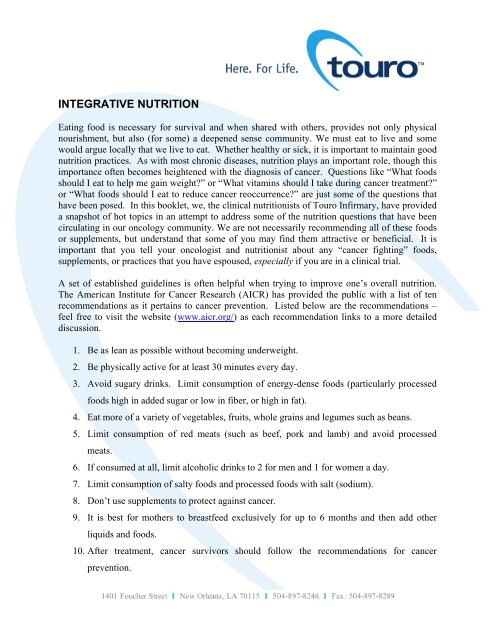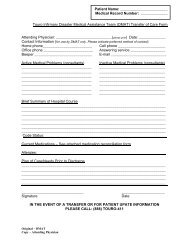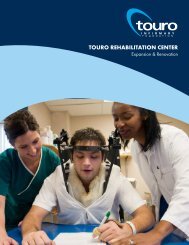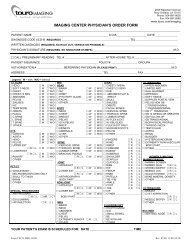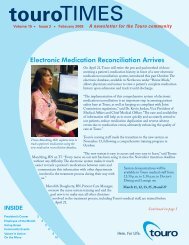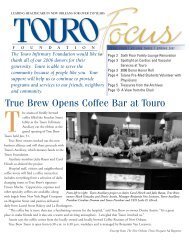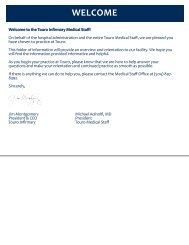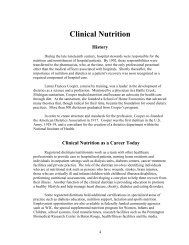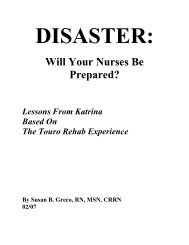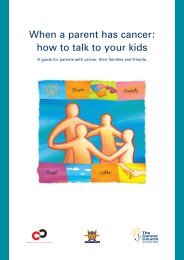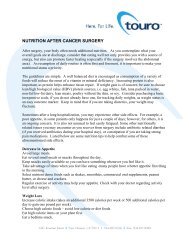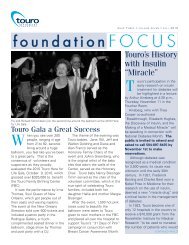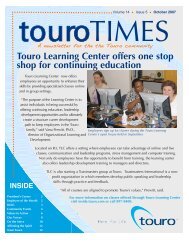INTEGRATIVE NUTRITION - Touro Infirmary
INTEGRATIVE NUTRITION - Touro Infirmary
INTEGRATIVE NUTRITION - Touro Infirmary
Create successful ePaper yourself
Turn your PDF publications into a flip-book with our unique Google optimized e-Paper software.
<strong>INTEGRATIVE</strong> <strong>NUTRITION</strong>Eating food is necessary for survival and when shared with others, provides not only physicalnourishment, but also (for some) a deepened sense community. We must eat to live and somewould argue locally that we live to eat. Whether healthy or sick, it is important to maintain goodnutrition practices. As with most chronic diseases, nutrition plays an important role, though thisimportance often becomes heightened with the diagnosis of cancer. Questions like “What foodsshould I eat to help me gain weight?” or “What vitamins should I take during cancer treatment?”or “What foods should I eat to reduce cancer reoccurrence?” are just some of the questions thathave been posed. In this booklet, we, the clinical nutritionists of <strong>Touro</strong> <strong>Infirmary</strong>, have provideda snapshot of hot topics in an attempt to address some of the nutrition questions that have beencirculating in our oncology community. We are not necessarily recommending all of these foodsor supplements, but understand that some of you may find them attractive or beneficial. It isimportant that you tell your oncologist and nutritionist about any “cancer fighting” foods,supplements, or practices that you have espoused, especially if you are in a clinical trial.A set of established guidelines is often helpful when trying to improve one’s overall nutrition.The American Institute for Cancer Research (AICR) has provided the public with a list of tenrecommendations as it pertains to cancer prevention. Listed below are the recommendations –feel free to visit the website (www.aicr.org/) as each recommendation links to a more detaileddiscussion.1. Be as lean as possible without becoming underweight.2. Be physically active for at least 30 minutes every day.3. Avoid sugary drinks. Limit consumption of energy-dense foods (particularly processedfoods high in added sugar or low in fiber, or high in fat).4. Eat more of a variety of vegetables, fruits, whole grains and legumes such as beans.5. Limit consumption of red meats (such as beef, pork and lamb) and avoid processedmeats.6. If consumed at all, limit alcoholic drinks to 2 for men and 1 for women a day.7. Limit consumption of salty foods and processed foods with salt (sodium).8. Don’t use supplements to protect against cancer.9. It is best for mothers to breastfeed exclusively for up to 6 months and then add otherliquids and foods.10. After treatment, cancer survivors should follow the recommendations for cancerprevention.
SuperfoodsFoods that contain antioxidants are considered “superfoods.” By definition, antioxidants aresubstances that prevent or slow oxidative damage. Our bodies use oxygen and naturally producefree radicals, which can cause damage. Antioxidants work to prevent the damage caused bythese free radicals and are typically referred to as “free radical scavengers.” Most of us knowthat fruits and vegetables provide us with a powerful source of antioxidants. Those vegetableswith the highest antioxidant capacity include: (in order of appearance)• kale• beets• red peppers• broccoli• spinach• potato• cornFruits with the highest antioxidant capacity include:• blueberries• strawberriesShould I buy organic? Yes, buying organic fruits and vegetables is recommended as pesticidesdo have harmful effects. However, the benefits of a diet rich in fruits and vegetables withpesticides far outweighs their elimination. The Environmental Working Group (EWA) haspublished a list of the 12 most contaminated fruits and vegetables, which include:• peaches• apples• sweet bell peppers• celery• nectarines• strawberries• cherries• lettuce• imported grapes• pears• spinach• potatoesIf the organic version of these 12 most contaminated fruits and vegetables is not a financialoption, the EWA has also provided consumers with a “least contaminated” list. The 12 cleanestfruits and vegetables include:• onions• avocado• frozen sweet corn• pineapples• mango
• frozen sweet peas• asparagus• kiwi• banana• cabbage• broccoli• eggplantAcai Berry/Mangosteen FruitBoth acai berry and mangosteen fruit are marketed as “cancer fighters.” While neither fruit hasbeen shown to fulfill this lofty health claim, both fruits are replete with vitamins, minerals, andphytochemicals. Consumers can purchase these products as a fruit, in the form of a processedjuice or as a supplement in capsule form. If undergoing cancer treatment (i.e. chemotherapy orradiation), it is recommended to avoid the dietary supplements that contain these plantcompounds as high-antioxidant supplements have the capacity to interfere with treatment.LycopeneThere is strong evidence to suggest a link between lycopene and prostate cancer prevention.Lycopene is an antioxidant found in tomatoes, with absorption being more pronounced inprocessed tomatoes, i.e. tomato paste. Eating tomato rich products increases the blood level oflycopene, which is associated with low prostate specific antigen (PSA) levels. A high PSA isoften suggestive of prostate cancer.Green TeaGreen tea, a staple in many Asian countries, comes from the same plant as black tea, but differsin its preparation. Green tea has received a lot of attention among the cancer community, likelystemming from the fact that it contains polyphenols, which act as antioxidants in the body. Thecurrent body of literature does not suggest that green tea is definitively preventative with regardto cancer. If, however, you are undergoing treatment, it is prudent to limit tea consumption toapproximately 2-3 cups per day as it should not serve as a meal replacement for more nutrientdense foods and supplements when weight loss or loss of appetite has ensued.SoyAs a plant protein, soy is available in many forms, including but not limited to tofu, tempeh, soymilk, edamame, soy nuts, and whole soybeans. The benefits of soy have received a lot ofattention over the past several years, especially as it concerns cardiovascular health. When
added to diet, soy protein can help lower total cholesterol and the more “atherogenic” lowdensity lipoprotein (LDL) cholesterol.Isoflavones, a component of soy, may have estrogen-like effects in the body. As such, thoseindividuals with hormone-sensitive cancers (i.e. breast, ovarian, or uterine), may be slow toincorporate soy in the diet. At present, there is not enough evidence based research to suggestthat women with estrogen-sensitive breast cancer should avoid soy products. Certainly, if youare undergoing a treatment protocol such as a clinical trial that bans soy consumption, you mustmaintain compliance.AlcoholAccording to the American Dietary Guidelines for Americans, drinking in moderation is definedas one drink per day for women and 2 drinks per day for men, respectively. One drink isequivalent to one 12 ounce beer, 4 ounces of wine, 1.5 ounces of 80-proof spirits, or 1 ounce of100-proof spirits. If you usually consume alcohol, consider that alcohol can irritate your mouthand throat and may exacerbate treatment related side effects. Be sure to discuss your choice withyour medical oncologist.The association between heavy alcoholic drinking and increased risk of certain cancers, namelyliver, head and neck, and esophageal, comes as no surprise. However, now researchers havelearned that moderate alcoholic drinking (defined as approximately 2-4 drinks per day in studies)may increase breast cancer risk in women - more specifically, women who developed breasttumors that were estrogen-receptor and progesterone-receptor positive. To learn more about thestudies that were conducted, refer to the American Institute for Cancer Research websitewww.aicr.org/ or the National Cancer Institute website www.cancer.gov.VitaminsAs nutritionists, we are often asked if it is acceptable or beneficial to take a multivitamin. Amultivitamin is not meant to be a substitution for a balanced diet. Rather, a multivitamin shouldserve as nutritional lagniappe – a little something extra as day to day intake is not alwaysoptimal. Patients are encouraged to eat a variety of foods in an attempt to not only meet thebasic energy needs of the body, but also to minimize newfound fatigue, often a treatmentassociated side effect. If your nutritional intake is inadequate (often secondary to a loss ofappetite or taste changes), be sure to select a one-a-day type of supplement providing 100 percentof the RDAs of vitamins and minerals.Before selecting a multivitamin, vitamin, or mineral at the store, we recommend reviewing theUSP website (www.usp.org/aboutUSP/) for a list of standardized products. All products that areUSP certified contain a USP notation on the label. In addition to checking for a USP notation, besure to check the expiration date before purchase and ingestion. Also, do not forget to take thevitamin or mineral supplement with food as this can help with absorption.
With a cancer diagnosis, it is easy to become overwhelmed. It is true that your cancer diagnosisand treatment should take precedence, but you do not want to forget about your other medicalhistory such as diabetes or heart disease and associated medications. For example, if you aretaking an anticoagulant such as warfarin (Coumadin®), you do not want to take supplements thatcontain vitamin K. Vitamin K plays a role in blood clotting and decreases the efficacy of thedrug. With progressive renal disease, you may also want to take special precautions when takingsupplements as kidney patients are often prescribed a special “renal” vitamin.Vitamin DDietary sources of vitamin D include fish, eggs, fortified milk, and cod liver oil, to name a few.In addition to dietary sources, regular sun exposure also provides us with a source of vitamin D.There is new research which suggests that vitamin D supplementation may prove beneficial asdeficiency is common. Supplementation with vitamin D 3 analogs may deserve consideration asdietary sources provide only small amounts of the recommended 1000 International Units (IU)and long-term sun exposure presents an additional challenge with increased skin cancer risk.Dietary SupplementsBefore taking any dietary supplements (especially during the treatment phase), it is important toresearch the supplement thoroughly. Share your decision to take a particular supplement(s) withyour medical or radiation oncologist and nutritionist as many pitfalls can be avoided. These listsby no means are exhaustive.If undergoing chemotherapy or radiation, these dietary supplements may interfere with theefficacy of the treatment:• Coenzyme Q10• Ginkgo Biloba• St. John’s Wort• Acai Berry supplements/Mangosteen Fruit supplementsIf you are taking an anticoagulant drug (i.e. Coumadin®, heparin), aspirin, NSAIDS (i.e.Advil®, Motrin®, Ibuprofen®), or have low blood counts secondary to chemotherapy, thesesupplements are not recommended:• Vitamin C• Vitamin E• Selenium• Coenzyme Q• Garlic supplements• Ginkgo Biloba• Ginseng• St. John’s Wort• Fish oil (omega-3 fatty acids)
• Ginger supplementCauses estrogenic effects in women and should be avoided in women with breast cancer:• GinsengRecommended CookbooksWhat to Eat During Cancer TreatmentAmerican Cancer Society’s Healthy Eating CookbookThe Great American Eat-Right CookbookCelebrate! Healthy Entertaining for Any OccasionReferences1. A Dietitian’s Cancer Story2. www.cancer.org/docroot/home/index.asp3. ww5.komen.org/breastcancer/complementarytherapies.html4. www.aicr.org/5. www.caring4cancer.com/go/cancer/nutrition/dietary-supplements6. www.cancer.gov/7. ods.od.nih.gov/Health_Information/Information_About_Individual_Dietary_Supplements.aspx8. nccam.nih.gov/health/9. cancerdietitian.com/complementary-therapy/10. www.cancer.med.umich.edu/support/nutrition_tips.shtml11. www.healthcastle.com12. www.mdanderson.org/education-and-research/departments-programs-andlabs/departments-and-divisions/clinical-nutrition/complementary-therapies/index.html13. cancer.ucsd.edu/14. www.dana-farber.org/15. www.usp.org/aboutUSP/16. www.americanheart.org/presenter.jhtml?identifier=442217. www.health.gov/DietaryGuidelines/dga2005/document/default.htm


